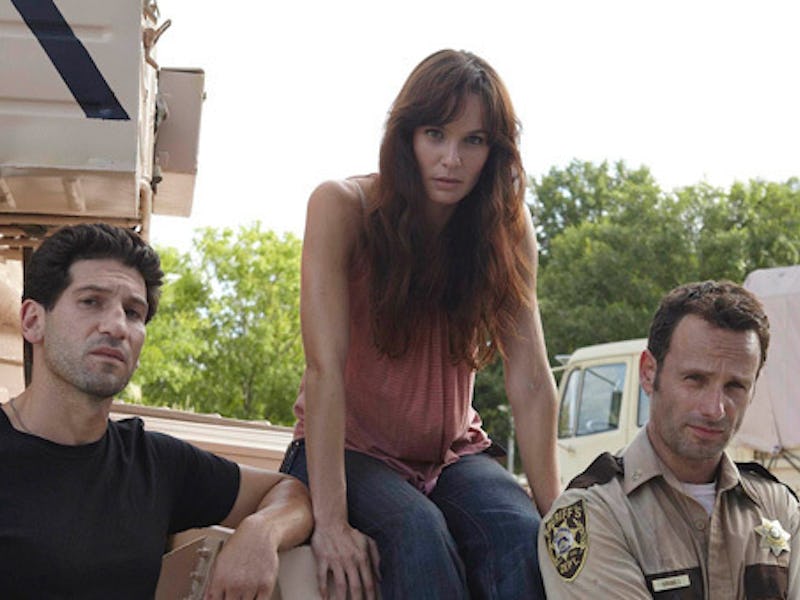'The Walking Dead' Doesn't Get Sex Because it Fetishizes Apocalyptic Love
According to historians and psychologists, zombie apocalypse survivors would be having way more sex

The dystopian entertainment boom hasn’t yielded many comedies — This Is The End and Last Man on Earth non-withstanding — and works that have strived to make light at the end of the struggle typically fall flat. You, Me and the Apocalypse, for instance, is an abomination.
The Walking Dead, America’s most watched show on television, isn’t an abomination, but it features plenty of them. Its popularity seems to stem from the way it magnifies and mimics the fears and fantasies of average Americans. Part of that makes sense: Many of us want to believe that we’d thrive in a world without credit card debt, technology, and economic structure, but part of the show’s popularity is also rooted in a deeply conservative mindset. That is, when all else goes to hell, including subcultures, race relations, and class, The Walking Dead wants us to believe that monogamous relationships will still be the most natural and popular sexual arrangement. No one in The Walking Dead has sex outside of a committed relationship, and this makes absolutely no sense.
We’ve seen the starving and the fearful on The Walking Dead, but we haven’t seen too many people fucking for comfort, in exchange for protection or goods, or as an act of pleasure outside the confines of a relationship. Lori found solace in Shane’s arms, which made her a complex character, but she was ultimately a character who made poor decisions. Her use of sex for comfort hurt her husband, Rick, and now she’s dead.
Glenn and Maggie are leads in an endearing love story, but they begin having sex purely because of the romantic feelings they have for each other. It’s not unrealistic to think a couple would form in a conservative, classical way, but their old-fashioned pseudomarriage probably wouldn’t be the norm among survivors of extreme trauma. By contrast, very early on in the comics, a couple minor characters are pictured having desperate sex in the dark while Rick worries about his wife. The understanding in these early issues of The Walking Dead is that reaching for a stranger is something humans tend to do when they’re frightened. In AMC’s The Walking Dead, sexuality is still taboo, meant for couples who practice monogamy, and the subject just doesn’t seem to come up often.
Imagine, if you will, a world where the drive for sex still exists, but the social norms that typically surround the act have eroded. Now consider what the average man is comfortable texting to a woman he met on Tinder. This doesn’t mean rape, exactly, although the show has eliminated several instances of rape from the comics books (this was part of what made The Governor so foreboding in the original text), but instead a readjustment to courting and foreplay that we have to speculate on, based on historical examples.
As mentioned above, sex was rampant among communities that were displaced and killed during the Holocaust. In some cases, prisoners used sex as a bargaining chip to request leniency from Nazi guards, but others simply used sex as a coping mechanism while living in concentration camps. In his analytic text, Oskar Rosenfeld and the Realism of Holocaust-History: On Sex, Shit, and Status, Berel Lang examines the ethics of realistic versus censored depictions of the experiences of Holocaust survivors. On the one hand, he argues that ignoring the uglier, more difficult-to-describe aspects of survival and trauma can be damaging. On the other hand, he expresses concern over tainting the image of survivors, which is understandable.
No one wants to be judged by what they do when they’re desperate.
Yes, Andrea made stupid decisions, but many of us would too!
There’s the rub. The gang on the The Walking Dead only admits people after Rick has interrogated them on what they’ve done and [who they’ve killed, to stay alive. Rick is puritanical, but he doesn’t end up spending too much time on a high horse because we don’t see any survivors who have become accustomed to prostitution and we don’t see any survivors using sex as a source of power, or as a source of physical pleasure. Sex, on The Walking Dead, is purely an expression of love and devotion. According to Lang, this is a neutered way of depicting survival and desperation, which are supposed to be the primary themes of The Walking Dead. Even if characters on the show wouldn’t have sex out of desperation, wouldn’t they have sex because it’s fun?
In her psychology text, Why Women Have Sex: Understanding Sexual Motivations from Adventure to Revenge (and Everything in Between), Cindy Meston asserts that the act of sexual intercourse is often a means of correcting a power imbalance. She believes that women are far more conscious of this fact than men are, which means female characters like Michonne, Maggie, and especially Carol, would probably be well-versed in how sexuality might help their odds of survival during a zombie apocalypse. Carol is a master of manipulation in almost every other facet of survival, so why not sex?
Rick is a candidate for casual sex during the apocalypse as well. In Writing the Apocalypse, scholar Lois Parkinson Zamora noted that many male characters in Latin American fiction tend to associate sex with escape. “If his paradise with his wife was lost because of sex, then it is through sex that he thinks he can regain it,” Zamora writes. She’s not writing about Rick, but the description applies.
When season 6 picks up again this weekend, we’ll see if Rick’s new obsession with Jessie plays out realistically. Based on what the show has given us so far, Rick is likely to make a matriarch out of Jessie, and that sexual bond will be evolve from emotion. That’s far from impossible, but it is absolutely implausible.